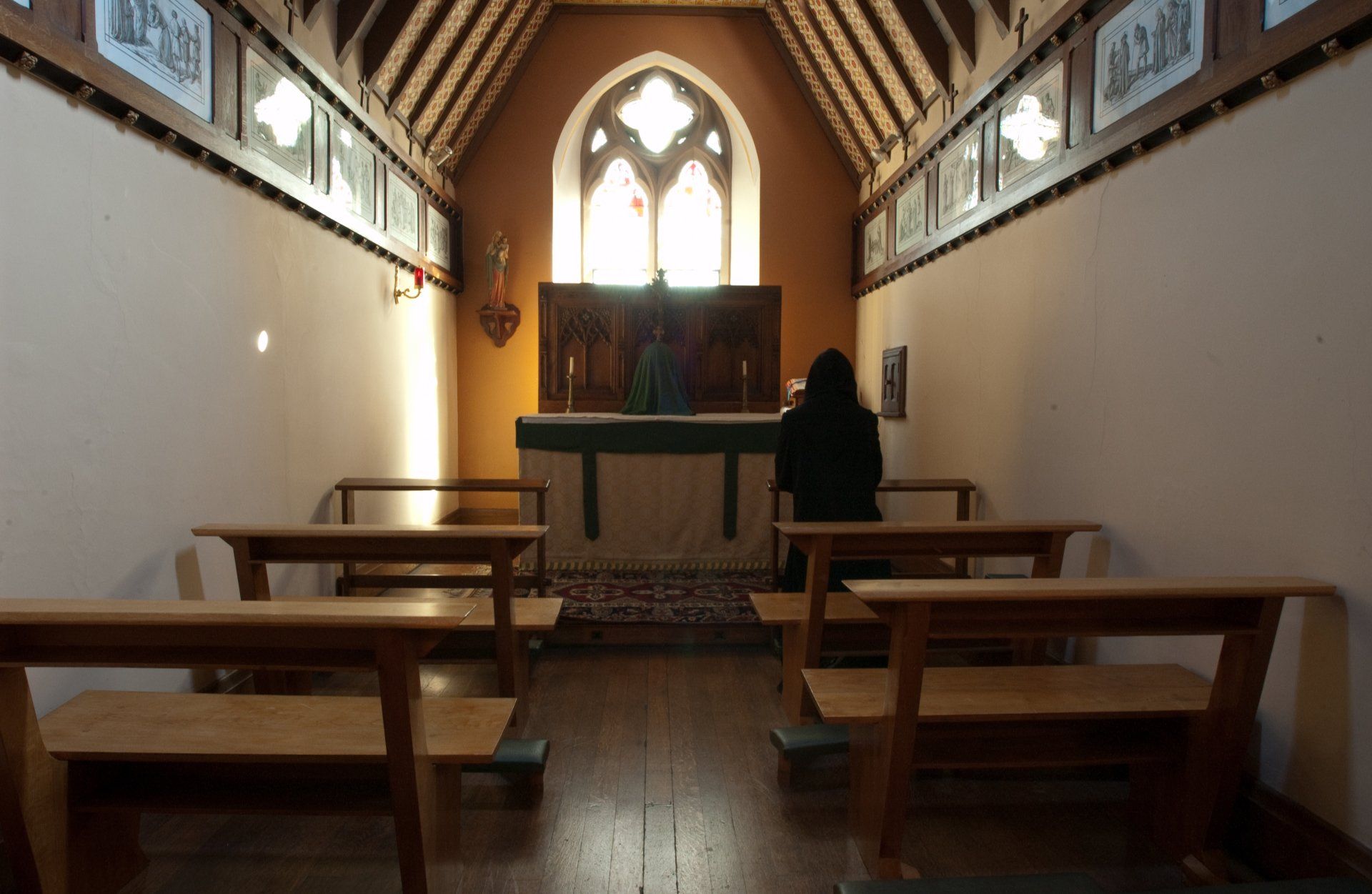Contemplative Prayer
Augustine Baker: a teacher of prayer
Fr. Augustine Baker OSB was born in nearby Abergavenny in 1575, and died in 1641. He is perhaps the great spiritual teacher of the post-Reformation English Benedictine Congregation, drawing on a breadth of the monastic and spiritual tradition from the medieval mystical tradition, such as The Cloud of Unknowing, as well as the Fathers of the Church, such a John Cassian. In one sense he made sure the English mystical tradition is kept alive and practised among Benedictines today.
In Baker’s his day people felt they were getting stuck in prayer with rigid methodologies. So he says that prayer is very much the work of the Spirit in a person’s heart, and we shouldn’t be too schematic and prescriptive. A person should move on to a freer kind of affective prayer, simply turning the mind and heart to God in various ways such as thanksgiving, or contrition or self-offering. So he recommended the use of set verses or short prayers, such as we might gather from the Psalms. He called it “the Prayer of Acts.” The Liturgy, lectio divina, and the writings of the Fathers of the Church feed this prayer.
Contemplative today
There are many ways of practicing contemplative prayer in the monastery and outside. Perhaps the most important thing is to set aside some time simply to be in the presence of God. For this reason a "half hour" each day is built into the monastic timetable to allow space. Some monks spend it in church, others in their cell.
We learn to prayer quite often through, by using the prayers of others. But then comes that moment of freedom when we feel happy to sit in the presence of God in silence. Some words my come to mind to hold on to, phrases from the Liturgy or Lectio Divina. Sometimes a prayer such as the Rosary can help. This is no more than reflecting on the mysteries of Christ, with the Virgin Mary. The repetition can slow us down and lead us deeper.
In Practice: Abbot Alan Rees
The former Abbot of Belmont, Alan Rees wrote a little book "Praying in the Benedictine Tradition" (Kevin Mayhew 1999) . There he explains how in the monastery the Liturgy and the Scriptures can feed our prayer in practice, but how it can also be used by those outside the monastery:
Some people like to say the hours of the Divine Office, but not all have the time for this. Everyone, however, can call to mind God's presence in a brief moment of silent prayer at intervals during the day. It is a good practice to commit to memory brief lines from the psalms that will then come readily to our lips when prayer is dry or distracted. All can capture the spirit of the Divine Office by memorising phrases from the various hours, such as the opening of Matins:

All can capture the spirit of the Divine Office by memorising phrases from the various hours, such as the opening of Matins:
and my mouth shall declare your praise.
Psalm 50:17
The ancient Fathers of the Desert recommended that, during the course of the day, we use frequently the text with which we begin the other hours:
O God, come to my aid. O Lord, make haste to help me!
Psalm 69:2
Psalm 69:2
Other short prayers from the office will also help us to recollect our thoughts and focus them on God during the day:
Lord, have mercy. Christ, have mercy. Lord, have mercy.
To you our praise is due;
we hymn your glory,
Father, Son and Holy Spirit. .
May God's assistance be with us always,
and with our absent brothers and sisters. Amen
Lord Jesus Christ, Son of God,
have mercy on me a sinner.
have mercy on me a sinner.
At the end of the day, the antiphon of the Song of Simeon and the blessing from Compline make a fitting conclusion to our prayer:
Save us, Lord, while waking
and guard us while sleeping,
that awake we may watch with Christ
and asleep we may rest in peace.
May the Lord grant us a quiet night
and a perfect end. Amen. New Paragraph
Blessed John Henry Newman: What is Meditating on Christ?

Christ Blessing: Giovanni Bellini
John Henry Newman: Parochial and Plain Sermons, VI, 40-42
What is meditating on Christ? It is simply this, thinking habitually and constantly of him and of his deeds and sufferings. It is to have him before our minds as one whom we may contemplate, worship, and address when we rise up, when we lie down, when we eat and drink, when we are at home and abroad, when we are working, or walking, or at rest, when we are alone, and again when we are in company; this is meditating. And by this, and nothing short of this, will our hearts come to feel as they ought. We have stony hearts, hearts as hard as the highways; the history of Christ makes no impression on them. And yet, if we would be saved, we must have tender, sensitive, living hearts; our hearts must be broken, must be broken up like ground, and dug, and watered, and tended, and cultivated, till they become as gardens, gardens of Eden, acceptable to our God, gardens in which the Lord God may walk and dwell; filled, not with briars and thorns, but with all sweet-smelling and useful plants, with heavenly trees and flowers. The dry and barren waste must burst forth into springs of living water. This change must take place in our hearts if we would be saved, in a word, we must have what we have not by nature, faith, and love; and how is this to be effected, under God's grace, but by bodily and practical meditation through the day?
Saint Peter describes what I mean, when he says, speaking of Christ, Whom having not seen you love: in whom, though now you see him not, yet believing, you rejoice with joy unspeakable and full of glory.
Christ is gone away; he is not seen; we never saw him, we only read and heard of him. It is an old saying, "Out of sight, out of mind." Be sure, so it will be, so it must be with us, as regards our blessed Saviour, unless we make continual efforts all through the day to think of him, his love, his precepts, his gifts, and his promises. We must recall to mind what we read in the gospels and in holy books about him; we must bring before us what we have heard in Christ; we must pray God to enable us to do so, to bless the doing so, and to make us do so in a simple-minded, sincere, and reverential spirit. In a word, we must meditate, for all this is meditation; and this even the most unlearned person can do, and will do, if he has a will to do it.
